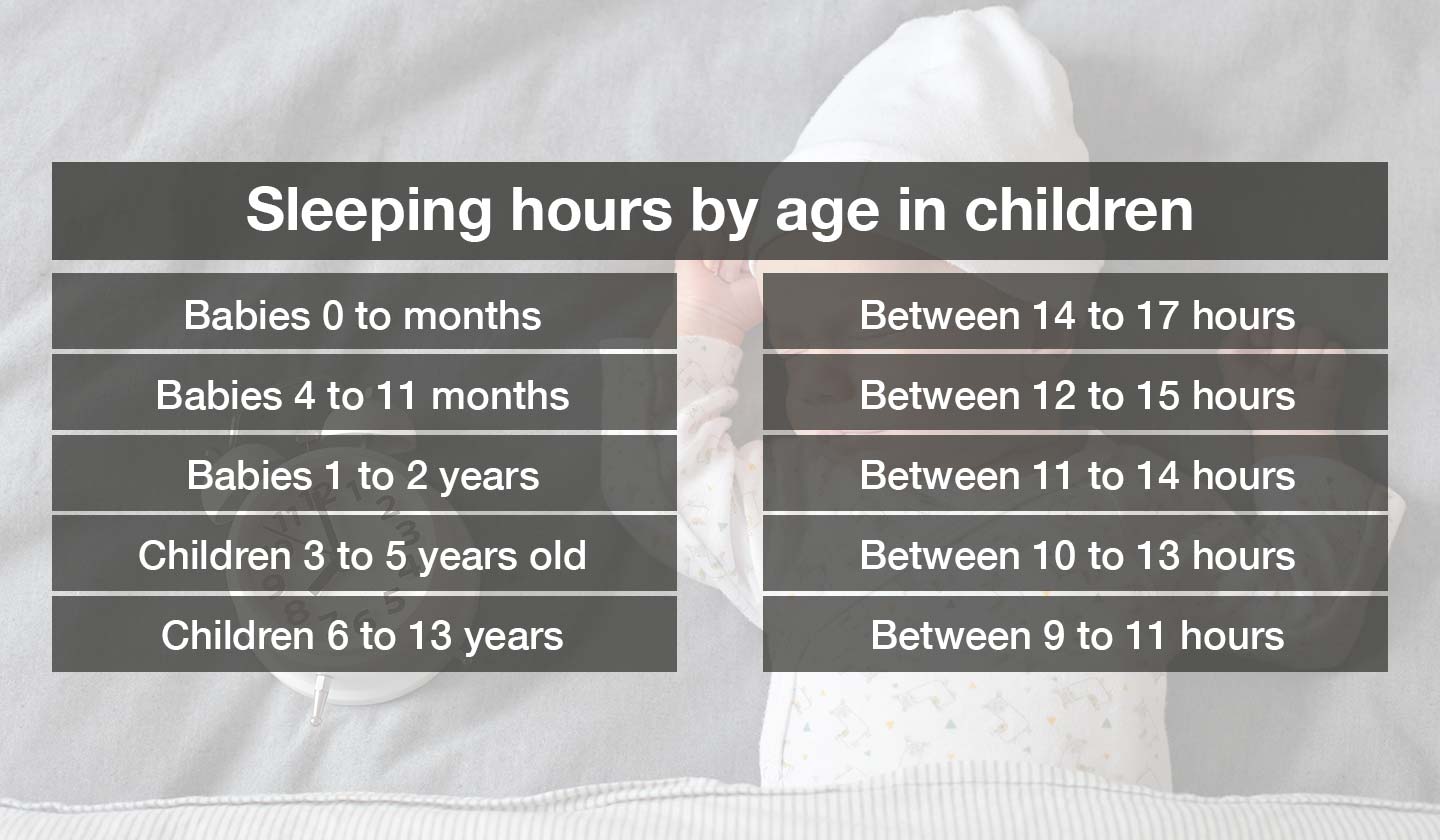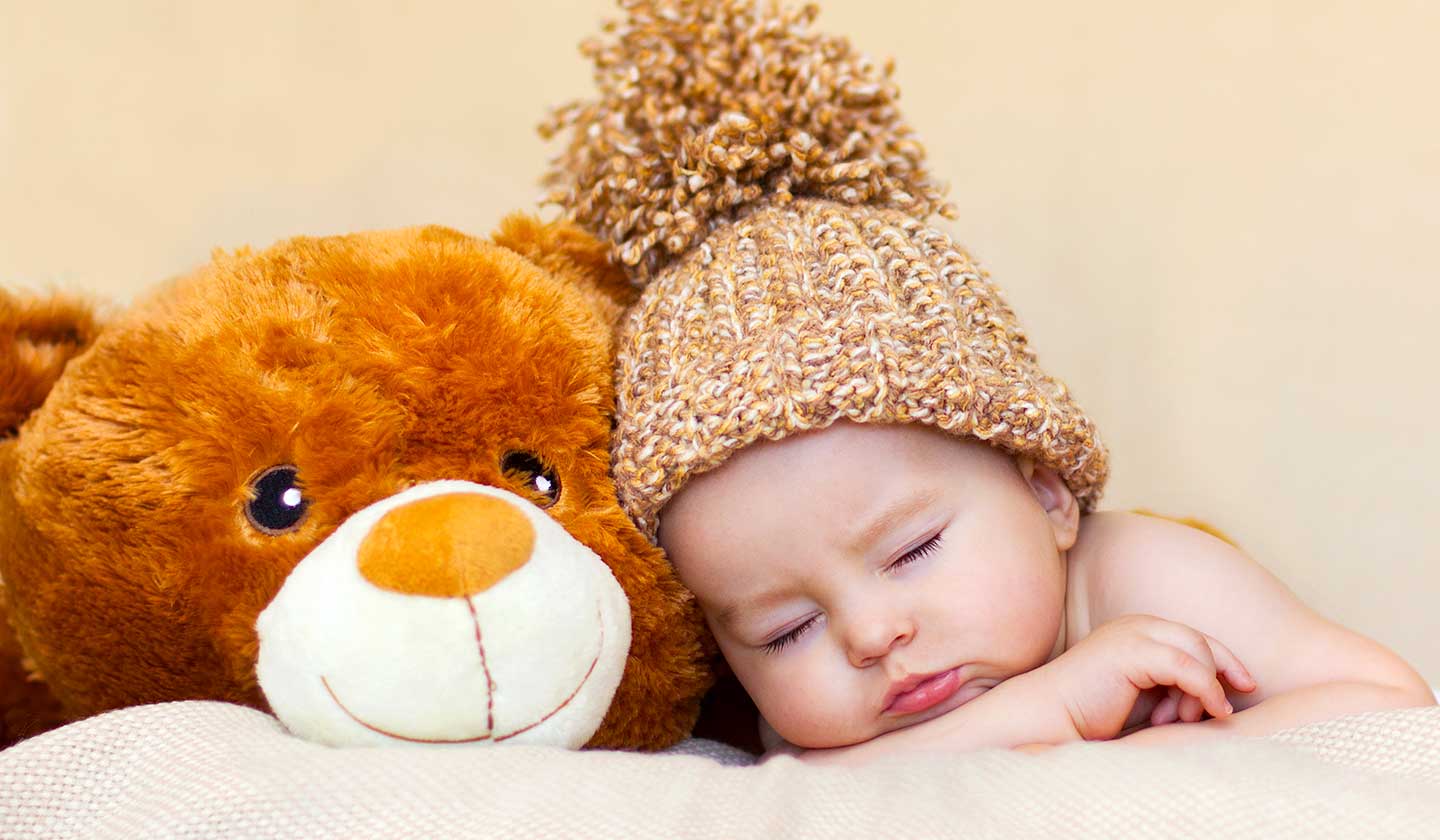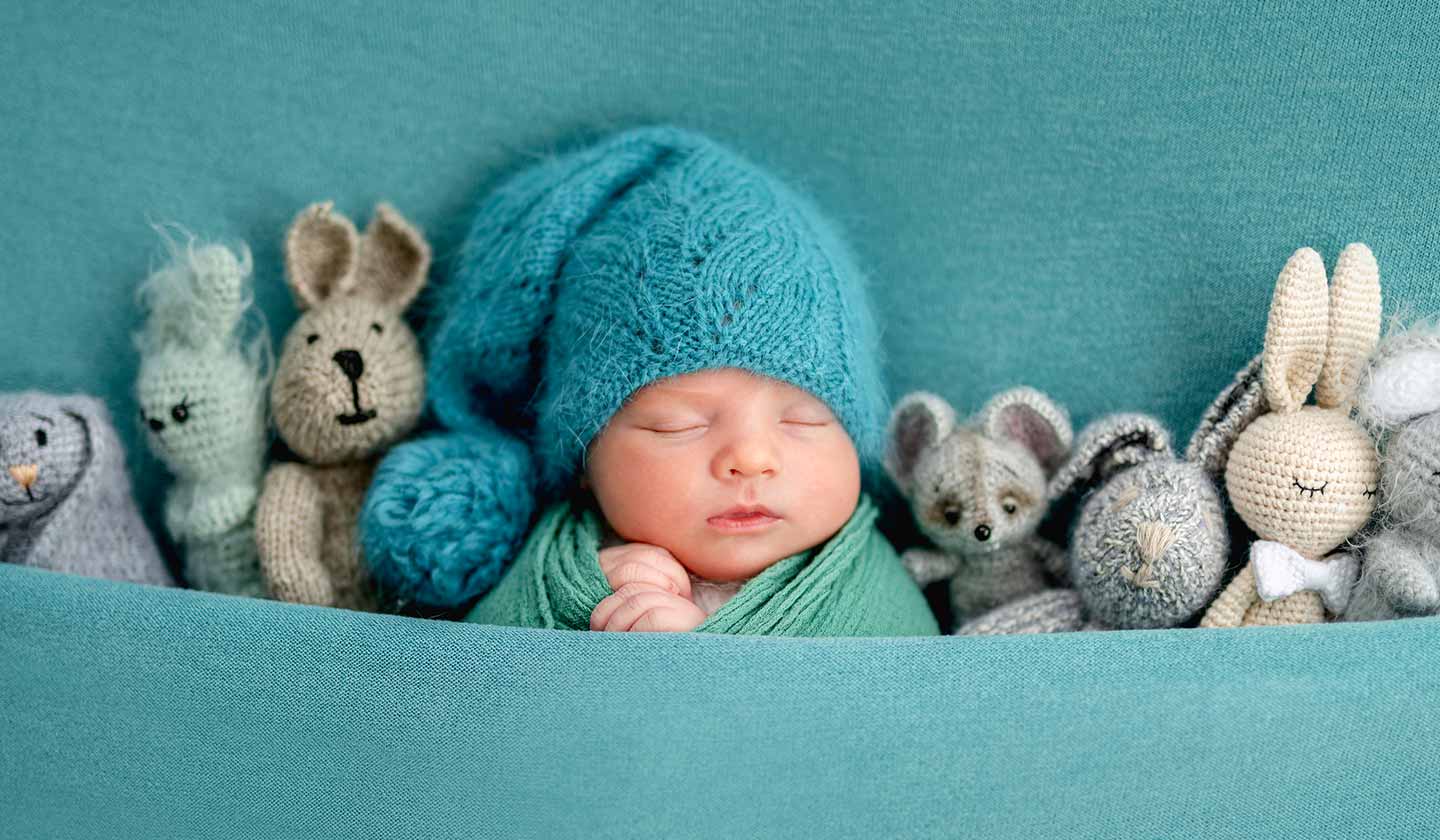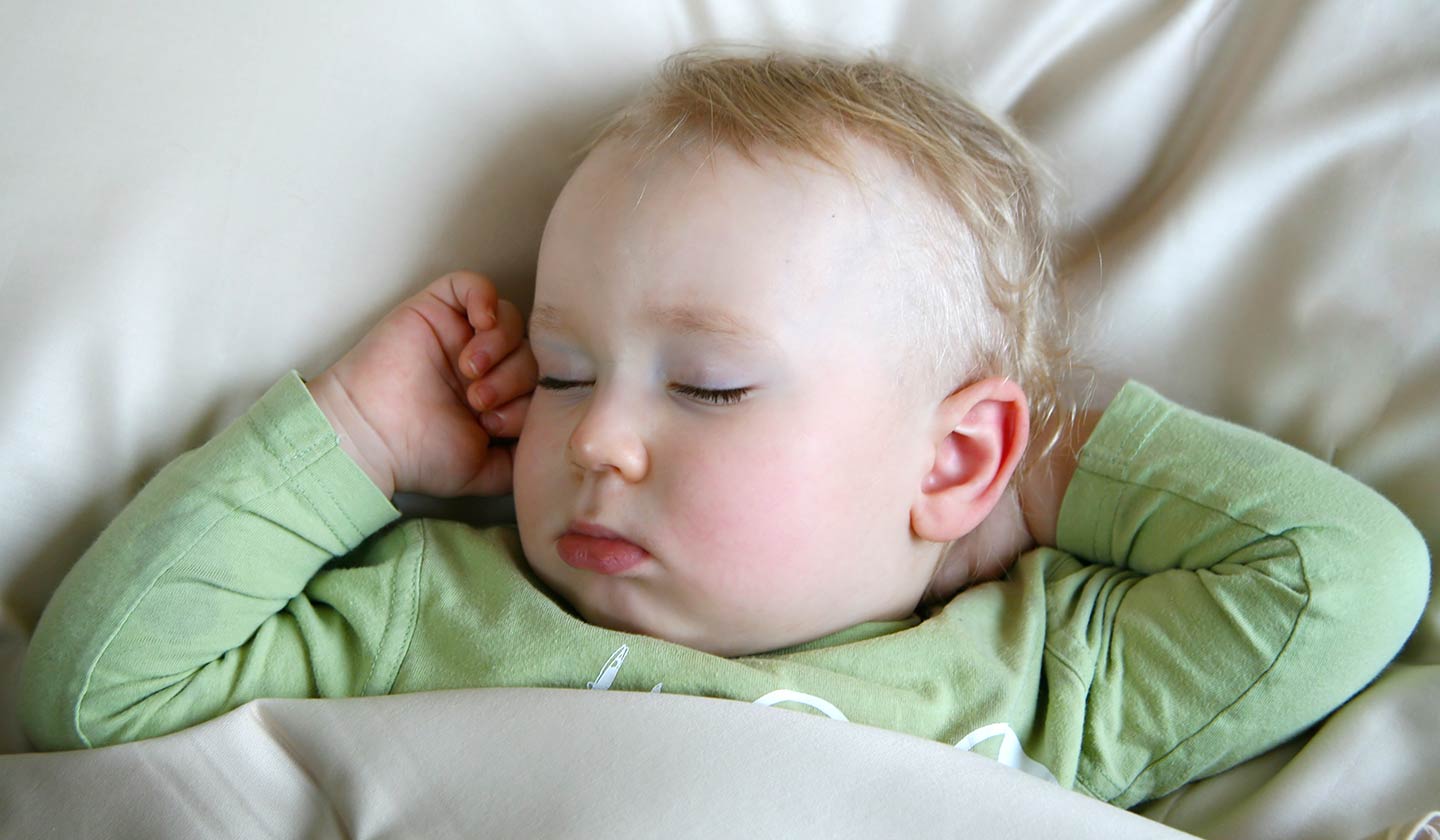Post childbirth
Baby's sleep

The need for sleep is physiological and sleep is essential to the well-being of the baby and the parents. But all couples, with more or less experience, fear that the birth of a child is synonymous with sleepless nights. To counteract this tendency, and instill good sleeping habits in your baby from an early age, it is important that you teach your child to sleep. Learn now how you can ensure your baby's rest and yours.
The Importance of Baby Sleep
In general, babies sleep a lot, up to 18 hours a day, especially in the first year of life.
However, this is a polyphasic sleep, which means that these hours are divided into several relatively short periods of sleep, with no circadian rhythm (the 24-hour period on which the biological cycle of living beings is based) and no distinction between day and night. In the second year of life, this phase will give way to a biphasic sleep, in which the baby takes naps and a long period at night.
Sleep is essential for physical and psychological recovery. But it is particularly important in babies, since it allows, besides recovering energy, the stimulation of the central nervous system development, the production of growth hormones, the reinforcement of the immune system and the activation of memory. It is therefore important to respect the baby's sleep rhythm and ensure that sleep disturbances are avoided.
The Portuguese Pediatric Society and the Portuguese Sleep Association have established a consensus on the recommended number of hours of sleep per day for children:

As baby grows, his sleep patterns change and adapt to his parents' sleep cycles.
As a general rule, baby's sleep cycle begins to become more regular around 6 months of age, and by 3 months of age baby is able to establish a day/night cycle. However, each case is unique, and it is not correct to idealize patterns.

How to teach baby to sleep?
It is indisputable that good sleep hygiene is crucial for a baby's physical and mental health. But this concern should start when he is still in the mother's belly. During this period, the secretion of the hormone that regulates sleep, melatonin, is regulated by the pregnant woman's body, so there must be extra care so that there is a sleep routine and that it has quality.
After birth, learning must continue and be reinforced. The first weeks of the baby's life are important for good habits to be imposed early on and to be maintained in the years to come. To do this, you should follow some tips and make sure they are applied from the very first moment:
- Keep the baby's crib in the parents' room until 6 months of age, when you should start getting the child used to sleeping alone.
- Adapt naps and their duration to baby's rest needs, keeping a regular schedule, varying only about 30 minutes between week and weekend.
- Create a bedtime routine, getting your baby used to going to bed after dinner and always at the same time, following a ritual.
- Get your baby used to sleeping in his crib early on, and not on your lap or in his parents' bed, for example. This will help him begin to understand that the crib is the proper place to sleep.

- Make an effort to have your baby fall asleep already lying in his crib, so that he can learn to fall asleep without depending on anyone's intervention.
- Pay attention to the temperature of the room so that it does not exceed 20°C.
- Ensure that the baby sleeps in a dark environment so that sleep is not impaired. It's okay to have a nightlight, for example.
- Give your baby a pacifier when he or she is used to breastfeeding. A pacifier can be very helpful at bedtime, as it soothes. However, it should be withdrawn by age 2 in order to avoid dependence and other medical problems.
- Make sure your baby sleeps comfortably, lying on a firm mattress and without loose clothing on the bed.
- Try to keep the baby lying down during the sleep period.

How a baby sleeps
The sleep of the newborn baby
The newborn baby does not know the difference between day and night. He needs to sleep and feed continuously, so that day or night matters little to him.
Oh, and he wakes up hungry!
To start teaching him the difference between day and night, you can adopt different behaviors at different times. During the day, talk more to your baby while feeding him. At night, adopt a quieter demeanor and employ a softer tone of voice. In time, your baby will understand the difference and begin to sleep more at night.
How a 3-week-old baby sleeps
Although the baby will still wake up to eat during the night, it will probably sleep longer uninterrupted periods, perhaps three or four hours. He will also begin to stay awake for longer periods.
Remember that if you are breastfeeding, your hormones rearrange your sleep patterns to match those of your baby, which can help you avoid sleep disorders. Babies who feed on starter milk may sleep for longer periods, because this type of milk tends to stay in the stomach longer.
Give him a little bath around 7 or 8 in the afternoon. The bath will help him stay awake, but it will also relax him to fall into a long sleep later.

How long a 2-month-old baby sleeps
Your baby is already starting to fall asleep on his own. Although your baby's sleep pattern is beginning to regularize, you should monitor him closely: it is still too early to set a schedule, so trying to impose one on him would not be advisable.
Babies of this age sleep a little less each day, compared to a newborn. Your baby will sleep most hours during the night (although usually not all in a row) and will stay awake longer during the day, although he or she will start taking, more or less, about three naps a day. As always, this varies from baby to baby.
Sleep at 4 months
By now, your baby has an easier time falling asleep on his own. This is the time to establish rules, as routine is very important for your 4-month-old. So try to make sure that bedtime and naps are always at the same time and in the same way every day. You don't have to be strict, just as consistent as possible.
Now that your baby is able to move around a bit, he is likely to fuss in his crib. Consider putting a pair of pajamas on him or he will end up uncovered and wake up cold. Read the label to make sure it is fire resistant.
Sleep at 6 months
Sleep patterns are different for everyone, and special circumstances, such as an illness or sleeping in a strange bed (at grandma's house, for example), can affect your baby's sleep pattern. Otherwise, you could say that your baby is getting used to his or her own patterns. Almost all healthy 6-month-old babies can sleep through the night, with no need to feed in the middle of the night or first thing in the morning, unless you want to be with your baby or are trying to keep your milk from drying up.
However, the baby is starting to get more stubborn: this is your last chance to decide where you want your baby to sleep, without your baby having a say in the matter. Outlining strict bedtime routines will help him fall asleep on his own!
Tip: Here are some practices that will help:
- Put your baby to bed while he is still awake, so he will get used to falling asleep in his own bed.
- But beware: if you feed him and/or rock him to sleep, he will expect you to do the same during the night.
- Give him a toy or a stuffed animal to help him fall asleep. A special blanket will also help your baby fall asleep.

The "little problems" of the 9-month-old
Sleep-related problems are very common at 8 or 9 months. Where once baby used to sleep through the night, now he may wake up in the middle of the night and, with him, all the other members of the family!
The baby now remembers you and misses you when he wakes up. If the baby is used to being rocked and cuddled to sleep, he will expect the same thing to happen in the middle of the night. It is up to you to decide if you are ready to participate in this routine or if you would rather your child learn to fall asleep again on his own.
Usually, at this age, your baby will take two naps. Both morning and afternoon naps usually last one to two hours. As a mother or father, you know better than anyone else how many hours of sleep your baby needs. However, regardless of your average hours of sleep, your baby will sleep less at night if the naps are too long.
Hint: Children tend to sleep more when they are sick; however, it is unusual for them to sleep an extra hour during their usual nap. If your baby is sick and sleeps longer than usual, consult your pediatrician immediately.
The 1 year old sleep routine
In the first year, bedtime problems begin. Your baby is so excited about his new abilities that it becomes increasingly difficult to get him to calm down and go to sleep. However, sticking to a bedtime routine will help you and your baby in the months to come
Tip: You may notice that baby's afternoon nap is a little shorter, and that he likes to play in his crib for a while before he calls for you to pick him up. Place some small toys in the crib to encourage this behavior. However, make sure that these toys are not too big, as the baby could learn to stack them and get down from the crib by making use of them.

Sleep well at 18 months
Life is so fun and intense for a one and a half year old baby that going to sleep is the last thing he wants to do. He needs your help to calm down at night so that he can get some well-deserved rest.
Since sleep needs differ from child to child, you will need to find out what is right for your baby.
Here are some suggestions that may be helpful to you:
Very soon, your child will only need one nap a day, but, it is likely that he or she will need two rest periods, even if one of them is brief. Many children who attend kindergarten take two naps, even if they don't need them. This means that your child will need fewer hours of sleep during the night.
If you don't want to face the problem of your child going to bed too late or waking up too early, it might be best to talk about it in kindergarten to change the number of hours your child sleeps during the day.
If you have an older child, it is actually possible that he or she may need to go to bed earlier than his or her younger sibling.
This becomes even more evident if the older sibling does not nap during the day. Your baby's nap time is a good opportunity to devote time exclusively to your other child.

The rest for the 2 years
A two-year-old baby is still trying to change the rules a little. And this is why "battles" become commonplace at bedtime. Your baby doesn't want to say goodbye to you, nor does he want the day to be over because it was so much fun! So let's see what you can do:
Establish habits and routines for bedtime. This is the best way to instill proper sleeping habits;
Start decreasing activity after dinner;
Reading, singing or playing quietly with a game are better activities to get into "rest mode" than running around the house;
Try to keep the routine before bedtime short and pleasant: bathing, brushing teeth and putting him to pee should not take more than half an hour or so. If it takes longer, your child will start to get excited and you will get frustrated.
But be aware: your child is likely to refuse, at least a few times, to go to bed. Be firm and consistent about bedtime rules. Children of this age do not need their own room. In fact, many children this age sleep better with someone else in the room: another child between 3 and 5 years old would be a good roommate. Older children can usually sleep just fine, even if there is a little noise around them.
Suggestion: leave a book or a toy that doesn't make noise on your child's bed so that he can entertain himself when he wakes up. Your child cannot understand the concept of "it's still too early," but you can tell him that he should stay in his room until the light comes in through the window or until he hears you say "good morning".
What sleep is like at age 3
Three-year-olds sleep on average about 12 hours a day. This usually means 10 or 11 hours a night and a nap of one or two hours. Nap times vary more in three-year-olds than in two-year-olds.
A three-year-old may need more or less hours of sleep and this will depend on the activities of the day, any possible illness, changes in routine, or their stage of development. The amount of hours your child needs to sleep naturally during the day is precisely the amount he needs.
The 3-year-old leads a very hectic life, stimulated by his imagination and language skills. At night, all this restlessness can be reflected in intense dreams and nightmares, which you can't try to avoid, as they help him to cope with the obstacles of his daily life. However, it can help you calm down every night through a simple, calm bedtime routine.
Ana Margarida Neto
(Pharmaceutical)
Também lhe poderá interessar
Postpartum
Breastfeeding - Make the most of this special moment
Dermatology






